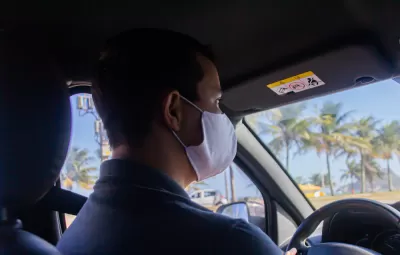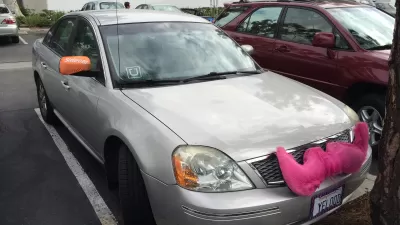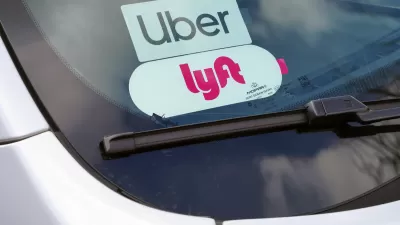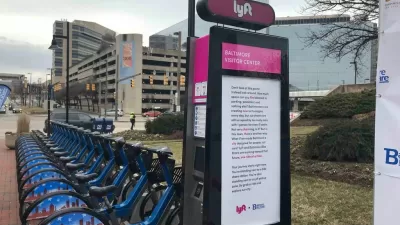With pooled services suspended through the pandemic and research showing most users prefer private rides, will shared rides continue to play a role in urban transportation?

As ride-hailing companies like Uber and Lyft faced backlash for producing more urban congestion with single-passenger trips, "pooled service seemed to offer a more city-friendly product," and autonomous vehicle producers also designed multi-person pods in preparation for a future of shared-ride transit. But with shared services largely on hold since the start of the pandemic, David Zipper, writing in Bloomberg CityLab, asks whether shared transportation can recover.
Back in February 2018, the nonprofit World Resources Institute unveiled the Shared Mobility Principles for Livable Cities, a set of guidelines that "included a commitment that autonomous vehicles would offer only shared trips within urban areas," according to Zipper. Since then, "a slew of evidence suggests that those who can afford to hail a vehicle would really prefer to have it to themselves," which is "worrisome news for public officials who hoped shared rides could help curb congestion — and for mobility companies who’ve pointed to sharing as a reason their products wouldn’t condemn cities to gridlock." While "sharing trips with strangers is the basic principle behind riding public transportation," sharing rides in private vehicles feels different than larger conveyances like trains or buses. "In a bad situation, you’re more likely to feel trapped in a ride-hail vehicle," making some users more reluctant to use shared rides even outside the public health risks posed by the pandemic.
Without policies to incentivize shared travel through increased convenience or lower cost, the dream of autonomous shared transit could devolve into a growing number of "individual AV trips grinding urban streets to a halt."
FULL STORY: Can Shared Mobility Survive the Pandemic?

Alabama: Trump Terminates Settlements for Black Communities Harmed By Raw Sewage
Trump deemed the landmark civil rights agreement “illegal DEI and environmental justice policy.”

Planetizen Federal Action Tracker
A weekly monitor of how Trump’s orders and actions are impacting planners and planning in America.

The 120 Year Old Tiny Home Villages That Sheltered San Francisco’s Earthquake Refugees
More than a century ago, San Francisco mobilized to house thousands of residents displaced by the 1906 earthquake. Could their strategy offer a model for the present?

In Both Crashes and Crime, Public Transportation is Far Safer than Driving
Contrary to popular assumptions, public transportation has far lower crash and crime rates than automobile travel. For safer communities, improve and encourage transit travel.

Report: Zoning Reforms Should Complement Nashville’s Ambitious Transit Plan
Without reform, restrictive zoning codes will limit the impact of the city’s planned transit expansion and could exclude some of the residents who depend on transit the most.

Judge Orders Release of Frozen IRA, IIJA Funding
The decision is a victory for environmental groups who charged that freezing funds for critical infrastructure and disaster response programs caused “real and irreparable harm” to communities.
Urban Design for Planners 1: Software Tools
This six-course series explores essential urban design concepts using open source software and equips planners with the tools they need to participate fully in the urban design process.
Planning for Universal Design
Learn the tools for implementing Universal Design in planning regulations.
Clanton & Associates, Inc.
Jessamine County Fiscal Court
Institute for Housing and Urban Development Studies (IHS)
City of Grandview
Harvard GSD Executive Education
Toledo-Lucas County Plan Commissions
Salt Lake City
NYU Wagner Graduate School of Public Service





























